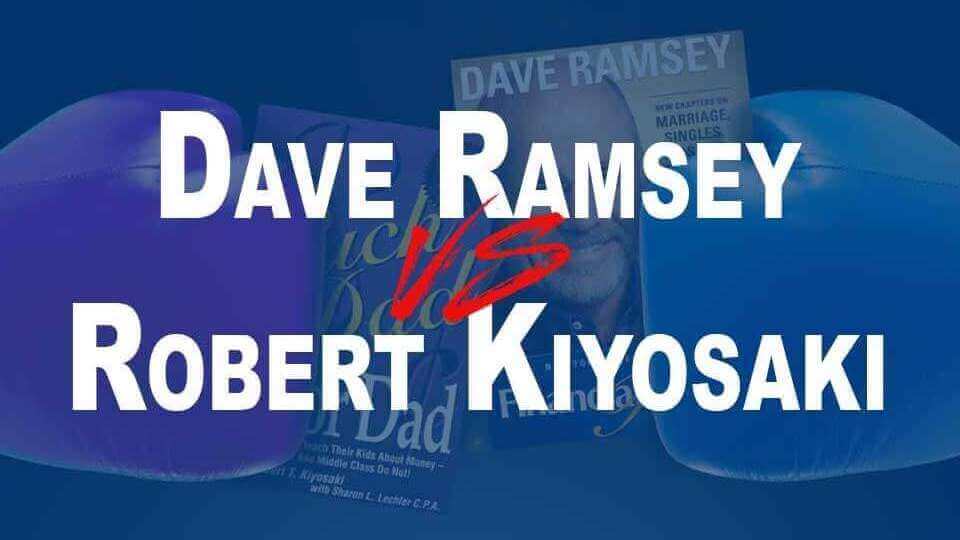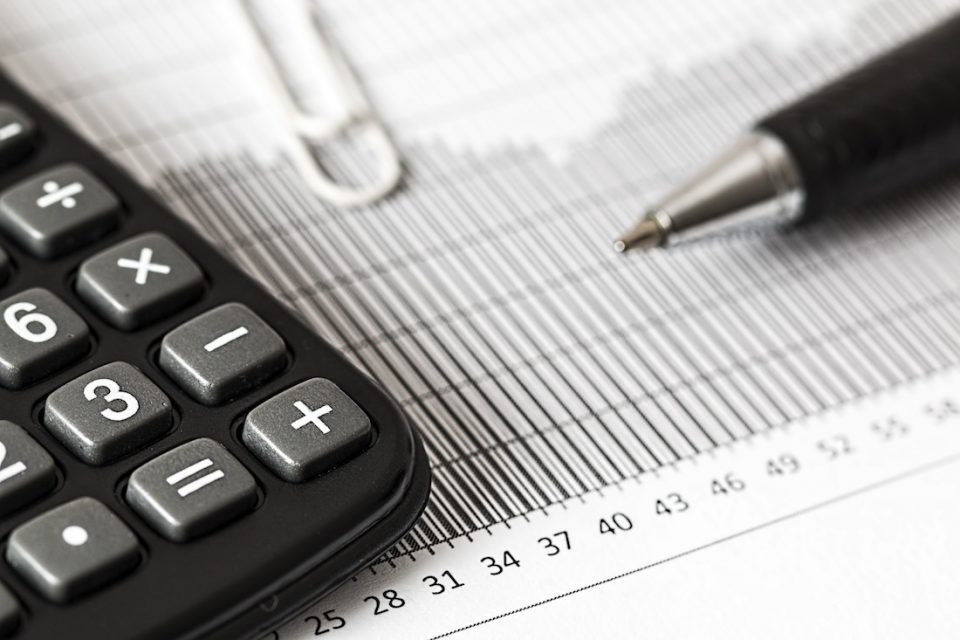
6 of the Most Popular Investment Options for College Savings
March 19, 2019
Why Personal Cash Flow Matters to the Business Owner
April 26, 2019An Epic Financial Battle! Dave Ramsey vs Robert Kiyosaki! Who’s Right?

Today we’re going to have an epic financial battle – Dave Ramsey vs Robert Kiyosaki. Dave Ramsey is famous for his Financial Peace series and Robert Kiyosaki is known for his book Rich Dad Poor Dad.
Which strategy is right for you? Is one person right and the other wrong? They have completely opposing views when it comes to some aspects of finances. Well, this Certified Financial Planner is going to take a look at their top seven financial strategies and dissect them.
Let’s lay the stage… Robert Kiyosaki is probably the first author that I completely read his book as a kid. He wrote the book Rich Dad Poor Dad and probably the most popular book in the financial world for many people. This book has probably sold more copies than any other financial book. He is the president/CEO of the Rich Dad, Poor Dad Company.
Dave Ramsey wrote a book called Financial Peace while working in the religious sect. This book series has also sold MANY copies in the years since it was written. Mr. Ramsey has a financial radio show that is nationally syndicated.
 What Dave Ramsey Teaches
What Dave Ramsey Teaches
1. Budget
Dave says, “look, we need a budget”. I agree with Dave, we need a budget. I personally use a program called Mint.com at home. In my business, I use a program called Quickbooks. No matter what you use, Dave says a budget is required.
2. No Credit Cards
For people who need help with financial discipline, having no credit cards is a good idea. But I also have seen people who use credit very frugally… we will come back to that idea.
3. Be Frugal
Dave says to live a frugal life. I don’t think there is anything wrong with living frugally. We just want to spend less than we bring home. It just makes common sense.
4. Save Money
Dave says we got to put a lot of money back and I agree with him. We need to have some cash for an emergency fund. Keep this in mind, cash is going to devalue every year because of inflation. If inflation increases by 2 percent, cash is going to be 2 percent less valuable to us next year.
5. Invest in Mutual Funds
Dave encourages people to invest in mutual funds. I heard the other day on a radio show that a good mutual fund can earn twelve percent. I’m not sure many investment advisors would agree with that percentage. What I do know is if you buy a good growth mutual fund and leave it alone, you’re going to be a lot better off than putting your hopes in cash.
6. No Debt
Dave hates debt. I don’t disagree with him. Debt can cause people lots of pain. It causes people to lay awake at night. But debt is not necessarily a bad thing if you know how to use it to your advantage.
7. Buy a House
Dave says the American Dream is a smart plan… go out with a little bit of money down and buy a home. But Dave also says pay the house off asap.

 What Robert Kiyosaki Teaches
What Robert Kiyosaki Teaches
Let’s go to the other side of the financial fence now. When Robert Kiyosaki came onto the picture he basically took what Dave was teaching and he turned it on its head by suggesting to readers to do the opposite of what Dave teaches in some situations.
1. Start a Business
Robert believes the best way to become rich is to start a business. He uses the example in his book how his “rich dad” started a business, his “poor dad” was an employee. I don’t know if I agree with that thinking but that is what Robert teaches.
2. Purchase Assets
What is an asset? An asset is a position that appreciates over time.
3. Buy Real Estate, Stocks, and Businesses
Instead of buying mutual funds, he says to buy real estate, to buy a business, to buy individual stocks. Is there anything inherently wrong with any of these asset classes? No, not necessarily. Is there anything wrong with mutual funds? No, not necessarily but Robert Kiyosaki really dislikes mutual funds.
4. Learn from Mistakes
Be prepared to make (financial) mistakes. It’s important when you fall down to learn from it and learn how you can improve from this point forward.
5. Use Debt
There’s probably nothing more contradictory or opposing in this battle between Dave Ramsey and Robert Kiyosaki than debt. Robert Kiyosaki will say USE debt – use as much as you can possibly get. But use it wisely. We never really hear that from the Dave side of the table. Instead, Dave says get out of debt.
RELATED READING: Strategic Debt Reduction in your Business
6. Use the Tax Code
Maybe I’ve missed it because I don’t spend my every waking minute following Dave Ramsey, but I’ve yet to hear where he gives tax-reducing strategies. Instead, he says, speak to your CPA or talk to your financial adviser.
RELATED READING: 49 Surprising Tax Write-Offs Available to Businesses
7. Don’t Buy a House
Robert Kiyosaki says don’t buy a home. He mathematically argues that a home can be a poor asset.
What Justin Goodbread (Certified Financial Planner) Teaches
Coming from my professional financial planner side, I have a few educated insights on the Dave Ramsey vs Robert Kiyosaki debate:
1. Budget
Let me start with Dave’s side. I’m a huge advocate of having a budget. I don’t think Robert’s stance would differ on the idea that a budget is required… you have to know your cash flow in order to run a business or purchase a property.
2. Under Some Circumstances Use Credit Cards
I don’t agree with the idea of not having credit cards. There are times that business owners can use credit cards properly to reap benefits. Credit cards have better protection than many debit cards, and many offer points back. So for that reason, I am leaning toward Robert about credit cards. But Dave’s audience is not the same as the audience that Robert is talking to.
3. Live Within Your Means
I do agree with being frugal and I do agree with saving a little bit of cash (but not a lot). Budget, live a frugal life, don’t spend more than you make.
4. Learn from Your Mistakes
Am I going to make mistakes? Yep. I’ll probably make a few today… but you better bet I will do my best to learn from them!
5. Invest
I’m not a big fan of mutual funds. I do use them in portfolios that I manage they have their place, but today we have exchange-traded funds, and we have other things which can traditionally give us lower fees and different return scenarios.
6. Start a Business
I’m on Robert’s side, yeah, you better believe I agree with starting a business! I see the ramifications of the business and how it helps me build net worth. Therefore, I believe in using assets and not liabilities. I bought a car for ten thousand dollars cash, I’m not going to go out buy a $60,000 car… it makes no sense. Do I agree with buying real estate, businesses, individual equities, and things of that nature? You better believe I do.
7. Smartly Use Debt
I’ve got personal reasons but I like the idea of using SOME debt. Let me give you an example of why. I’ve got a friend who has a $200,000 house that was paid for with cash. That means he has two hundred thousand dollars that he could have deployed somewhere else, instead of sitting there earning no money. He could be paying 5% on a mortgage and earning more than 5% in investments. On the other hand, if I go over here to Robert Kiyosaki, he says don’t buy a home. I agree with Dave Ramsey to buy a home. Why, because not everything is solely about money… I personally want a garden, I want trees that I can pick peaches off of. If I’m renting a house, more than likely I’m not going to have the thirty acres of land, a tractor, a place for my goats and chickens, and all that fun stuff. I probably can’t rent this type of lifestyle so am I gonna say that I disagree with Robert. In my experience as a CFP® professional, I have seen people take advantage of buying a house and I have seen people that don’t need to buy a house. What I disagree with Dave is to pay the house off. You’ve got tax ramifications, legal ramifications, every state is different on homesteading exemptions, the list goes on and on.
RELATED ARTICLE: How to Use Debt in Your Business
8. Use the Tax Code
I’m going to use debt because I know that using debt aggressively in my business, and using it purposefully, will help me build net worth faster. I also know how debt “enhances” my tax returns. Dave Ramsey rarely talks about this.
I’m going to use the tax code to my advantage. I’m going to work with a good qualified tax planning CPA to help me.
The Rich Dad Poor Dad vs Dave Ramsey debate summed up:
- Dave Ramsey’s plan is going to give the “Average Joe” a little bit more peace of mind.
- Robert Kiyosaki’s plan will make you more wealthy (if you’re able to follow it.)
- Be aggressive in business: do as much as you can to drive revenue, work with a good CFP™ practitioner and a CPA that can help you minimize your taxes because they’re gonna pay more money out of taxes than anything else.
- Use debt wisely. Use debt to generate cash flow.
- Create multiple streams of income. To me, it makes sense to build net worth in multiple ways.
Is one of them right or wrong? Look, choose for yourself. I think there’s a good blend between both of them. I think there are potential dangers with both extremes. I’m just challenging you to think.
Could you benefit from the services of a CFP® practitioner? Reach out to our team for a personalized consultation.
Always remember, no system or financial planning strategy can guarantee future results. Therefore, no current or prospective client should assume that the future performance of any specific investment, investment strategy, or product will be profitable. While we believe the information in this report is reliable, we cannot guarantee its accuracy. Opinions expressed are subject to change without notice and are not intended as investment advice or a solicitation for the purchase or sale of any security. Please consult your financial professional before making any investment decision or contact us if you don’t have a financial planner.
Here at Financially Simple™ we want to help you make informed financial decisions for your small business with confidence. In doing so, we might recommend products and services that offer us compensation when you use them. This compensation is used to help offset the cost of creating the content we give to you for free. We will, however, never suggest products/services solely for the compensation received. As stated before, our goal is to make understanding money for the business owner, his family, and anyone visiting this website—financially simple.





